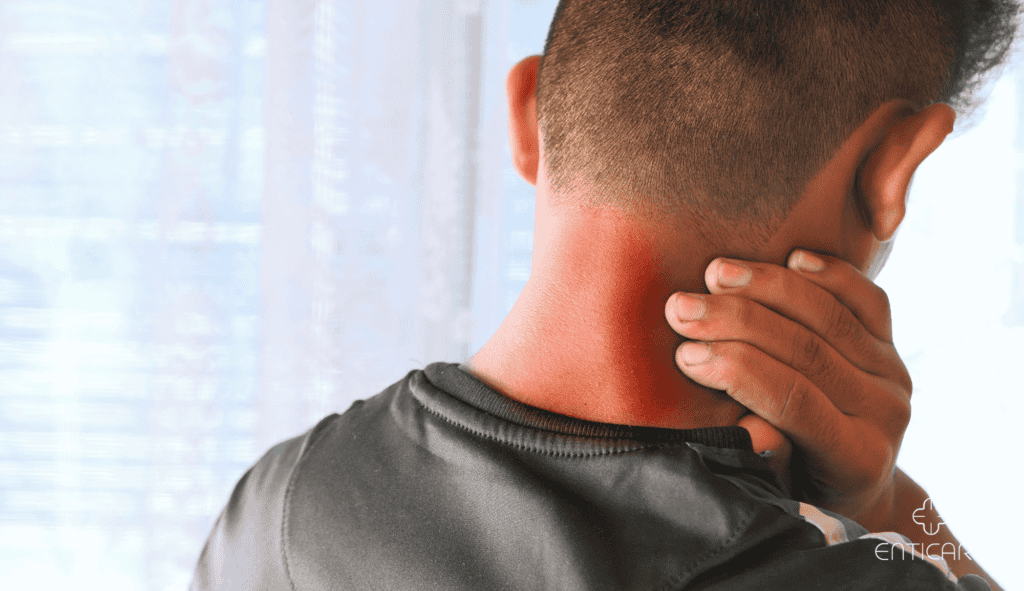Sleep apnea is a serious sleep disorder that disrupts breathing patterns during the night, leading to a host of symptoms, including headaches and neck pain or shoulder pain. Sleep disordered breathing, which includes conditions like sleep apnea, disrupts breathing patterns during the night, leading to a host of symptoms, including headaches and neck pain or shoulder pain. These physical discomforts often stem from the stress sleep apnea places on the body, impacting both sleep quality and overall health. In this blog, we’ll explore how sleep apnea contributes to headaches and neck or shoulder pain, offer insights into managing these symptoms, and provide tips for preventing future discomfort. Let’s dive into the connection between these symptoms and how to find relief.

Understanding the Causes of Headaches with Sleep Apnea
Oxygen Deprivation
When breathing pauses occur, the resulting hypoxemia, or lack of oxygen in the bloodstream, can cause headaches. This condition, known as hypoxia, is a common cause of morning headaches in those with untreated sleep apnea. Reduced oxygen flow to the brain can result in throbbing pain or a feeling of pressure.
Increased Blood Pressure
Sleep apnea often leads to elevated blood pressure during sleep, as the body struggles to restore normal breathing. This can trigger vascular headaches, which are linked to changes in blood flow and pressure. Morning headaches are particularly common in patients with obstructive sleep apnea.
Tension Headaches from Poor Sleep
Chronic sleep deprivation, caused by frequent awakenings, can result in tension headaches. The body’s inability to get deep, restorative sleep places constant stress on the muscles, leading to headaches upon waking. Additionally, chronic sleep deprivation from sleep apnea can contribute to chronic pain, further exacerbating the discomfort experienced by individuals. Addressing these musculoskeletal issues is crucial for managing the pain and discomfort associated with sleep apnea.

The Connection Between Neck and Shoulder Pain and Cervical Spine Pathologies in Sleep Apnea
Muscle Strain and Breathing Effort
Sleep apnea increases the effort required to breathe, particularly during sleep. Over time, this extra effort can lead to muscle strain in the neck and shoulders. The tension builds as the body compensates for blocked airways, which in turn causes discomfort and pain. Additionally, spinal pathologies can exacerbate muscle strain and contribute to neck and shoulder pain. Addressing these musculoskeletal issues is crucial for managing the pain and discomfort associated with sleep apnea.
Sleeping Position and Pain
People with sleep apnea often sleep in awkward positions in an attempt to improve airflow, such as tilting the head back or sleeping on their sides. These positions can create misalignment in the spine and neck, leading to stiffness and soreness in the neck and shoulders. Addressing these musculoskeletal issues is crucial for managing the pain and discomfort associated with sleep apnea.
Referred Pain from Jaw Issues (TMJ)
Sleep apnea has been linked to temporomandibular joint (TMJ) disorders. The stress from clenching or grinding teeth during sleep may radiate pain to the neck and shoulders, compounding the discomfort experienced by individuals with sleep apnea. Additionally, the use of oral appliances for sleep apnea, such as mandibular advancement devices, can contribute to transient temporomandibular pain, suggesting a need for further evaluation and management in patients experiencing pain-related symptoms associated with OSA. Addressing these musculoskeletal issues is crucial for managing the pain and discomfort associated with sleep apnea.
Managing Headaches and Neck/Shoulder Pain with Sleep Apnea
CPAP Therapy
Continuous positive airway pressure (CPAP) therapy is one of the most effective treatments for sleep apnea. By maintaining a steady airflow and keeping the airways open, CPAP reduces the frequency of breathing interruptions and helps alleviate related headaches and muscle pain. Addressing these musculoskeletal issues is crucial for managing the pain and discomfort associated with sleep apnea.
Ergonomic Pillows and Sleep Positions
Specialized pillows designed for individuals with sleep apnea can provide better neck and spine alignment, reducing tension and pain in the neck and shoulders. Side sleeping with proper head support can also help improve breathing and reduce discomfort. Addressing these musculoskeletal issues is crucial for managing the pain and discomfort associated with sleep apnea.
Regular Stretching and Physical Therapy
Stretching exercises that target the neck and shoulders can help alleviate muscle tension caused by sleep apnea. Physical therapy sessions can also assist in addressing muscle imbalances and improving posture, further reducing discomfort during sleep.
Consulting a pain management clinician can provide personalized pain management strategies, especially for those dealing with chronic conditions like cervical spine abnormalities and pain associated with obstructive sleep apnea. Addressing these musculoskeletal issues is crucial for managing the pain and discomfort associated with sleep apnea.

Preventing Sleep Apnea-Related Headaches and Chronic Pain Prevalence
Weight Management and Lifestyle Changes
Maintaining a healthy weight can significantly reduce the severity of sleep apnea, as excess weight contributes to airway blockages. Incorporating regular exercise, eating a balanced diet, and managing stress can help prevent the recurrence of symptoms such as headaches and muscle pain. Addressing these musculoskeletal issues is crucial for managing the pain and discomfort associated with sleep apnea.
Sleep Apnea Treatment Options
Sleep apnea cases are prevalent, with obstructive sleep apnea (OSA) comprising the majority, making it crucial to explore different treatment options. In addition to CPAP therapy, alternative treatments like oral appliances or surgery may help improve sleep apnea symptoms. Consult with a sleep specialist to explore these options and determine the best course of treatment based on your condition. Addressing these musculoskeletal issues is crucial for managing the pain and discomfort associated with sleep apnea.
Addressing TMJ and Jaw Clenching
For patients experiencing TMJ issues, dental treatments such as mouthguards can help alleviate pressure on the jaw and prevent referred pain in the neck and shoulders. A dentist specializing in sleep apnea can provide guidance on managing these symptoms. However, it is important to note that there is limited evidence of a significant relationship between sleep apnea and chronic pain prevalence. Addressing these musculoskeletal issues is crucial for managing the pain and discomfort associated with sleep apnea.
Take Action for Better Sleep and Pain Relief
Headaches and neck or shoulder pain are common symptoms experienced by those with untreated sleep apnea. By understanding the causes and seeking proper treatment, you can alleviate these discomforts and enjoy better quality sleep. Don’t ignore these warning signs—effective treatment is available. Untreated sleep apnea can also increase the risk of coronary artery disease, a serious cardiovascular disorder. Sleep apnea is a prevalent condition that requires timely intervention to prevent serious health complications. Schedule an appointment with a sleep specialist today to discuss your symptoms and explore personalized solutions.
Schedule an appointment today and start your journey toward relief from sleep apnea-related headaches and pain.

